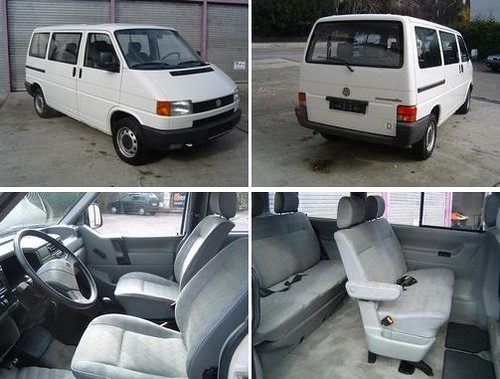Or as they call them over here FolksWagon. While another Mercedes would have been nice (and there are plenty of affordable ones) we just couldn’t manage to find one that would fit the family and the budget. The overall price wasn’t so important — since we think the vehicle will have little or no capital depreciation in the time we expect to own it — but running costs were. So a diesel engine for running costs since it has an intrinsically higher efficiency and the fuel is cheaper[1].
After a fair bit of searching, I found a 1994 7-seater VW Caravelle (‘VW’ is pronounced ‘fou-vee’ here). It’s white and a previous owner had been a heavy smoker. When I first saw it at the car yard, it was quite, well filthy is the best word for it. So I managed to negotiate the trader down a couple of hundred euro (I am traditionally pretty hopeless at bargaining) and got professional cleaning and a one year guarantee thrown in. While it wasn’t an absolute bargain, I think it was a pretty fair price, especially considering it has only 154,000km on the odometer (which frankly I have a hard time believing). The cleaning, which took a couple of days, made a vast improvement and though the smell of smoke still lingers, it is greatly reduced. I’m amazed at how sensitive the nose of a non-smoker can be to residual tobacco fumes. In fact, I had my suit coat hung on the back of the front passenger seat for about 20-30 minutes and after putting it back on and away from the vehicle I there was the distinct smell of smoke on it. Anyway, here are some pictures of an identical vehicle.

I paid a sizeable deposit when the contract was drawn up and this enabled me to take the ‘Fahrzeugbrief’ (registration papers) with me. So armed with this, a ‘Doppelkarte’ (literally translated as ‘double card’, like an insurance cover note) and Gaynor’s residence registration papers we headed by train to Düren — about 10-15 minutes away and is the main town of the local shire, Kreis Düren — and to the ‘Strassenverkehrsamt’ (‘Street traffic office’. Oh how they love their compound words!)
Registration consisted of waiting in line for a clerk (unfortunately for us ours was non-English speaking), having them check through the papers and assign a licence plate number. She asked if we wanted a particular sequence of characters but we declined since I wanted to have the car driven that day, knowing how long custom plates can take to make up. She then hands us a ‘smart card’ which we take to an automatic payment machine (the card contains your payment details) and then cough up the cash (about 30€). We then head back to her, but she looks confused and asks where our licence plates are. We beat her at her own game by looking even more confused. Across the language divide it eventually comes that we need to go to one of two shops in the building complex to collect the plates. Having seen these shops on the way in and wondering what they were for, it suddenly clicked. At the shop, they look at the character sequence you’ve been assigned, pull out a blank plate, arrange the characters on the press and make your plate right there! So much for waiting for a custom plate. We could have ordered something more exciting than ‘XQ 928’! We paid another 30€ to the lady at the plate pressing store who, speaking excellent English, helped explain the whole process that we had just about finished! We took the plates back to the clerk who placed some official stickers on them and that was it. I kept expecting to have to pay the ‘real’ registration costs which I estimate will be about 350€ per year, excluding insurance — which is taken out privately anyway (this is the purpose of the ‘Doppelkarte’ mentioned above). However, she didn’t ask for the registration money and so I expect they will send me a bill.
She also didn’t ask to see our fervently sought residency permit! I even presented it as part of the paperwork, but she declined it. Quick conclusion: We didn’t need one. Gaynor’s passport was sufficient. Quick emotional response: Arrrrgggghh!
So the short of it is, we are once again independently mobile. The past couple of months have been an excellent time to think about what a valuable and convenient resource a car is, but I’m glad the pontificating is over.
[1] The price of diesel is currently about 1,05€ per litre compared to petrol/gas/benzine of 1,15€ — convert to your currency of preference here. Based on ~20Mm per year, the difference between an 11l/100km petrol van and an 8,5-9l/100km diesel van is about 50-65€ per month.